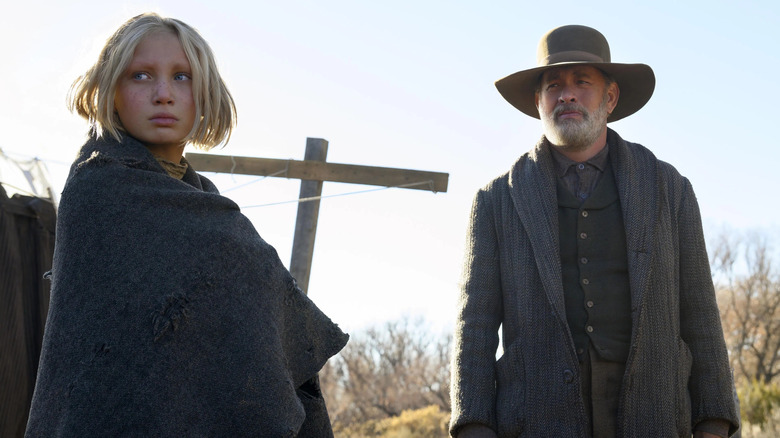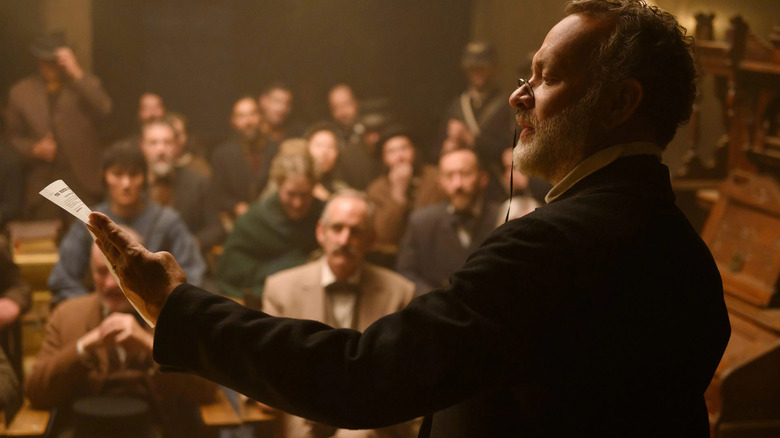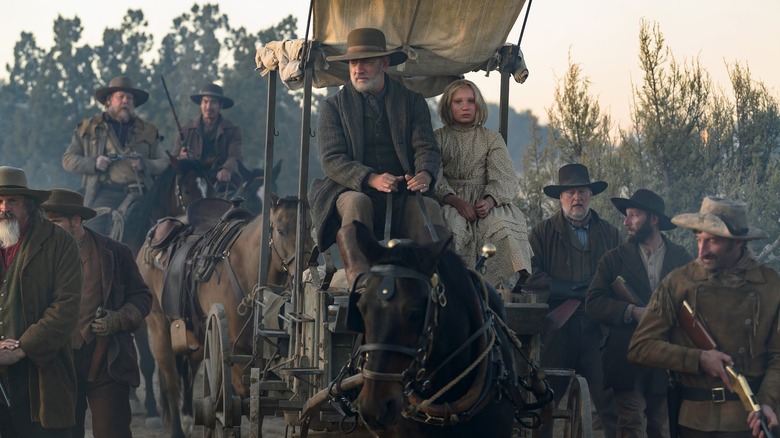The Underrated Tom Hanks Western You Definitely Shouldn't Have Skipped
In Paul Greengrass' 2020 film "News of the World," Tom Hanks plays Captain Kidd, a former Confederate who travels around Texas in 1870, plying his new career. Because newspapers don't make their way out to rural parts of the state, and because he is literate, Kidd earns a few meager cents by riding from city to city reading newspapers aloud to the locals in exchange for an admission fee. Post-war Texas is a stern and terrible place. He is barely surviving.
On the road, he passes a lynched Black man, and, in the man's abandoned horse cart, finds Johanna (Helena Zengel), a young blonde girl who, bafflingly, only speaks Kiowa. Kidd finds that she has been kidnapped by the Kiowa people six years before, and was being raised among them. She had recently kidnapped back by Union soldiers, and was being taken to her blood relatives in Texas when her driver was murdered. Kidd, after some bureaucratic complications, chooses to return Johanna to her relatives himself. A friend who speaks Kiowa helps Kidd learn that Johanna's Kiowa family was also killed, and that her new name is Cicada. The bulk of the film follows Kidd and Johanna on their long roadtrip home, with Kidd stopping along the way to read newspapers — and occasionally killing ruffian former Confederates who want to buy and/or accost Cicada.
"News of the World" should have been, by its tone, story, and pedigree, an Oscar-bait movie of the highest order. Greengrass has long been celebrated for his raw, unflinching style, and Hanks remains one of the world's most notable movie stars. The film was slated for release on Christmas Day in 2020, however, right in the early days of the COVID-19 pandemic. The $38 million movie only made back $12.7 million, and it vanished from the consciousness. That's a pity, because "News of the World" is quite good.
News of the World was eaten up by COVID
"News of the World" should have been more widely discussed because of how timely it was. It came right at the end of the first Donald Trump administration, an administration rocked by dozens of scandals and marked by the President constantly whining about positive news coverage. In "News of the World," some of the small towns Kidd visits only want to hear a very specific kind of news story. Notably, Kidd runs into Farley (Gabriel Ebert), the leader of a racist militia who asks that Kidd read pro-militia stories that glorify him personally. The movie is about how selective news coverage is tantamount to propaganda, something that was (and still is) happening openly in the real world.
This was all amidst a larger story of the scars left on the nation after the Civil War. The Johanna character was left without a home, abandoned by society because of her association with the Kiowa people. She was left alone by violence, war, and racism. Kidd, meanwhile, is growing into a better person, quietly realizing that his fellow Confederates are awful people. He is alone in the world after his wife died (of cholera) during the war, so he and Johanna begin to bond as an ersatz family. "News of the World" is poignant and meaningful, but also moving and emotionally raw. Greengrass and cinematographer Dariusz Wolski shoot the movie with more grace and classicism than usual, eschewing the director's usual gritty, handheld camerawork. "News of the World" is simultaneously a classic Hollywood melodrama and a rough-hewn political drama.
Critics were positive, and "News of the World" currently has an 88% approval rating on Rotten Tomatoes, based on 270 reviews. It was only because of its bad distribution that "News of the World" went largely unseen.
The honked up release of News of the World
A.O. Scott, writing for The New York Times, noted that the film overall was sympathetic without being sentimental, while Amy Nicholson, speaking on KPCC's "Film Week," was particularly impressed by Zengel's performance, noting the intelligence behind her eyes. Vulture's Bilge Ebiri loved the film's skillful blend of Old Western images and story beats with a very modern philosophical concern. The main criticisms of "News of the World" seemed to be its slow pace and episodic structure.
The bad distribution model of "News of the World" doomed it to obscurity. As mentioned, it was released during the height of theater closures, keeping audiences well away from it. Even its Christmas release date didn't put it in at the forefront of the Oscars conversation. Still, it did manage to snag four nominations, for Cinematography, Score, Production Design, and Sound.
"News of the World" was initially greenlit by Fox way back in 2017, but it was handed over to Universal after the notorious Disney/Fox acquisition. When it finally came out, it felt like one of the many properties that Disney off-loaded during what was essentially an industry firesale. Then, to compound the film's curse, it was released into empty theaters. Perhaps in a less tumultuous time, "News of the World" would have gained more eyeballs, more awards attention, and even more critical acclaim. Of course, it may very well find a new audience, as the world is currently enduring a second Trump term, and his tendencies to attack news outlets remain strong. Sadly, "News of the World" remains as timely as ever.


